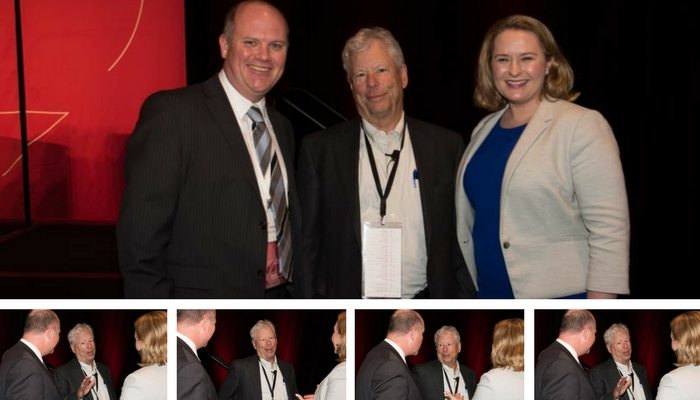In September 2017 Quantum Financial attended the Morningstar Exchange Traded Fund (ETF) Conference in Chicago where Richard Thaler gave the keynote address.
Both Tim Mackay and Claire Mackay were lucky enough to meet and discuss financial planning with Professor Thaler.

Professor Thaler is the Charles R. Walgreen Distinguished Service Professor of behavioral science and economics at The University of Chicago Booth School of Business. Two weeks after the conference, he was awarded the Nobel Prize in Economics for his pioneering work on behavioural finance.
Professor Thaler is known as the ‘Father of Behavioral Finance’, a topic which you may never have heard of. However, believe it or not, he has probably already affected your life.
Along with a respected group of behavioral economists, Professor Thaler merged psychology with decision making theory, economics and sociology to create this new field of finance and economics that has changed the way we see the world.
In our discussions with Professor Thaler, he expressed a strong desire to visit Australia once more and when we told him we were financial advisors he stopped us mid sentence.
Quick as a flash he jumped in with “No, you are psychologists. You can’t do your job well unless you understand how your clients think.”
According to Professor Thaler “People have been trying to nudge people for a long time and you can do it to try and help people out or to swindle them. Bernie Madoff was an expert at nudging…..You need to nudge for good.”
He has three key lessons for advisors which we at Quantum Financial strongly believe in and follow:
- Understand the lessons of behavioral finance when working with clients – According to Professor Thaler ““If the main thing that a financial adviser does in a session with a client involves looking at spreadsheets, then they’re not doing their job. It is as much psychology as it is finance.”
- Do the work – apply the wisdom you learn into practice, which is much harder than you think. Knowledge that isn’t actively applied in our advisory practice accomplishes nothing. According to Professor Thaler “Recognising that the job of understanding what your clients’ goals and fears and needs are is at least as important as crunching the numbers.”
- Embrace the fiduciary standard – always act in your clients’ best interests. According to Professor Thaler “Anybody who doesn’t think that a financial adviser should be acting as a fiduciary should find another line of work.”
Here are some of the key ways Professor Thaler has changed the way we see things:
- Nudges are more effective than nagging
We all know we need to save more for our retirement. In Australia we are one of the few countries with compulsory super which helps in this regard. But in the USA, UK and most other countries they don’t. Nudge theory teaches us that if we voluntarily have to contribute to retirement savings most of us won’t. We’re too busy, it’s too complicated, it’s just all too hard.
However if you’re ‘nudged’ into being automatically enrolled in a retirement savings scheme and you have to opt out, then there is far more chance you will save more for your retirement. The result is millions of people around the world are better off by recognising our behaviour is impacted by our emotions.
- Make it simple
How good does that sound when it comes to your finances? Professor Thaler recognised decades ago that humans are not completely rational automatons. We make decisions on how we feel, gut instinct and how others make us feel. He saw that the way we are forced to make financial decisions is just all too complicated.
If there was a way to boil down financial decisions into simpler ones then we’d be better off. The way we are offered choice in finance is incredibly important. Consider when you apply for a credit card. Do you think you’d make a better decision under the current legal compliance rules (with everything spelt out in intricate in fine print detail) or under a system where you could immediately and transparently see the all fees and charges?
- Economics is about people, not abstract theories
As humans we regularly make bad financial decisions because our emotions overrule our rational thinking. When things in shops are on sale (prices go down), we buy more of them. However, when markets go down we panic and sell, and wait until markets recover before buying back in (sell low, buy high) which is the exact opposite.
None of us are Mr Spock when it comes to rational decision making (here is a New York Times article written by Professor Thaler titled ‘Unless you are Spock irrelevant things matter in economic behavior’)



